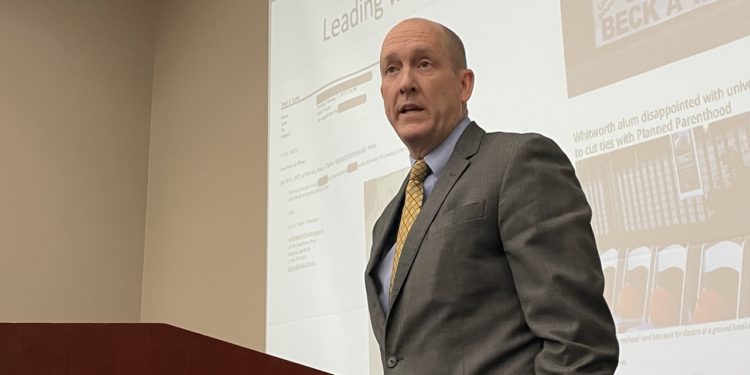On Feb. 16, Samford President Beck Taylor hosted a presentation titled “Leading When People are Unhappy.” The presentation was an installment in the ongoing Leadership Lunch Series, a monthly speaking series made up of Samford staff and faculty members who each discuss a topic focusing on leadership through a Christian lens.
Free lunch from Ashley Mac’s and convo credit was provided to students who signed up to attend the event, which was held in the Howard Room in the UC. The talk began at noon and lasted about an hour.
During the lecture, President Taylor discussed his own experiences and difficulties in leadership, focusing on the difficulties faced when those you’re leading are upset or unhappy.
Those specific difficulties in leadership may prove more common now than in years past. Taylor described our present moment as an “age of discontent,” a time in which people, as a result of the reduced face-to-face accountability brought on by factors like social media and the pandemic, have become much more vocal about their anger and dissatisfaction than they might have been previously.
Taylor cited numerous examples from his own life when people were displeased with his actions and leadership, including a union controversy from his early days at Whitworth University, and the extended news coverage that occurred after he severed ties with Planned Parenthood.
His role in higher education, Taylor explained, involves a variety of diverse constituencies, including everyone from students to staff, parents to policy-makers, and these assortments of alignments, agendas, and opinions don’t always agree with one another. Because of these often-conflicting desires and demands, disappointing people is a foregone conclusion. And deciding who it is that ends up unhappy can be difficult.
“As a leader, you don’t get to make an easy decision,” Taylor lamented.
He explained that if a leader does their job well, only the hard decisions will end up on their desk. The decisions found on said desk won’t be a simple case of good and evil, but a frustrating and difficult choice between competing goods.
While there may not be a way to avoid disappointing someone, Taylor believes there is an antidote which can alleviate some of the ill-will garnered from these tough positions. That antidote is open communication.
If people understand the reasoning behind the choices that were made, they can sometimes understand it, even if they don’t necessarily agree with it.
This openness and honesty, Taylor believes, is especially important when communicating with the current generation, who have learned to maintain a healthy skepticism of institutions in a way his generation hadn’t. Over the years, accessibility and transparency have become necessities for gaining and maintaining trust.
Taylor wrapped up his lecture by reciting his favorite leadership quote, spoken by Teddy Roosevelt during his 1910 “Man in the Arena” speech, which expressed how it is “not the critic who counts” but “the man who is actually in the arena, whose face is marred by dust and sweat and blood,” and how, though some failure may inevitable, “if he fails, [he] at least fails while daring greatly, so that his place shall never be with those cold and timid souls who neither know victory nor defeat.”

Contributing Writer






